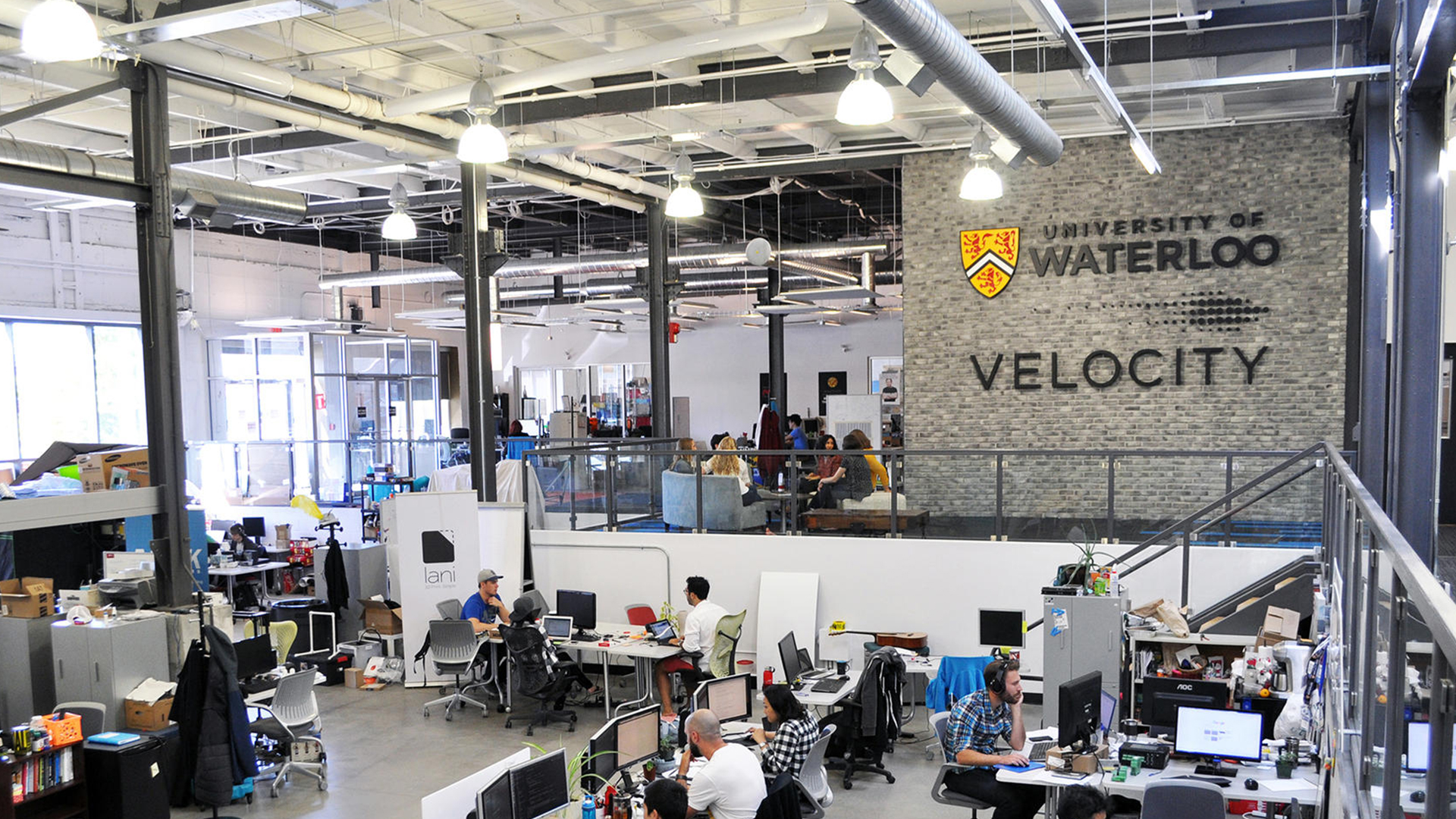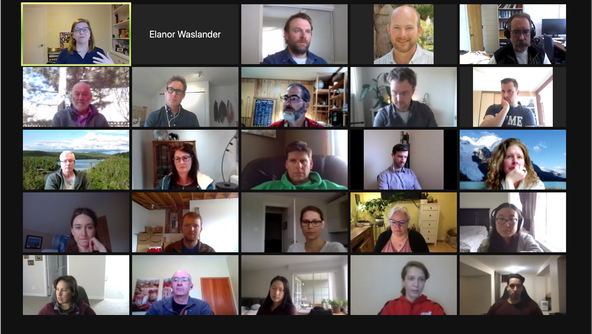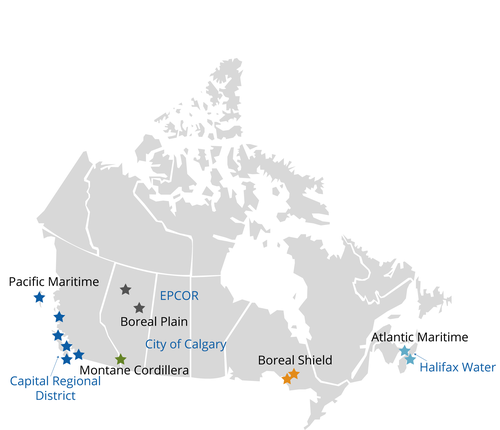Editor:
Brandon Sweet
University Communications
bulletin@uwaterloo.ca
Velocity companies secure more than $2B in funding

This article was originally published on Waterloo News.
Companies at the University of Waterloo’s flagship entrepreneurial incubator have broken through a major funding milestone.
The total amount of funding raised by Velocity companies surpassed $2.4 billion in recent weeks, less than two years after the program announced it had reached the $1 billion mark over the previous decade.
The news comes at a busy time for Velocity and its founders. In June, the educational technology company ApplyBoard was valued at $4 billion after raising $375 million. And the retail-tech company Faire secured a round of financing that valued the company at $7 billion—nearly triple the firm’s valuation last October.
Together, the financing rounds marked a 40 per cent increase in total funding raised by alumni and residents of the University’s incubator since November 2019.
“We are proud of Velocity’s founders and employees and the incredible contributions the incubator has made to our regional and national tech ecosystems,” said Vivek Goel, president and vice-chancellor of the University. “This is an exciting milestone for these companies as the University and our regional partners come together to support entrepreneurs by helping them grow talented and innovative companies, solving real-world problems and affecting global change.”
Over the past decade, Velocity has played a key role in the journeys of many influential companies in Canada’s tech ecosystem, including unicorn companies Faire, Kik and ApplyBoard, as well as other tech heavyweights like Embark, Bridgit, Vidyard and OpenPhone.
“We continue to see Velocity alumni scale companies that can reshape entire industries,” said Adrien Côté, executive director of Velocity. “We are focused on supporting the next generation of founders to build the next billion-dollar Canadian companies.”
Velocity is one of the most successful pre-seed and seed incubators in Canada and its current companies represent an important early indicator of which world-changing technologies will become commonplace in the near future. Recent growth in funding is moving towards the health, CleanTech and food and agriculture companies, Côté said.
“At Velocity, we are expanding programing that accelerates the ability for the de-risking of technologies, leading to a surge in a more diversified ecosystem of companies including those focused on ‘deep tech” in the areas of engineering innovations and scientific advances,” Côté said. “We are working to help founders validate the technologies and providing these companies with access to resources to turn deep technologies into products, speeding up their time to market.”
In 2023, the University will launch the Innovation Arena, a 90,000-square-foot space in the heart of the Kitchener-Waterloo Innovation District, with Velocity at the core of the new facility. The Innovation Arena at the University’s Health Sciences Campus will connect researchers and emerging talent with community, business and health partners to advance innovation and technology solutions, and help drive Canada’s next wave of economic growth.
Velocity is still accepting applications from new start-ups for 2021. Companies selected will be invited to join the incubator, get access to their world-class lab space, mentors, and programs, and are eligible to receive $50,000 to $100,000 in investment from the Velocity Fund.
Read more about the $2.4-billion funding milestone on the Velocity blog.
CIHR Project Grant Reviewer Panel Session coming on August 11

University of Waterloo researchers who are interested in submitting a project grant application to the Canadian Institutes of Health Research (CIHR) are invited to attend a virtual grant reviewer panel session on August 11.
The panelists, who have served on a broad range of grant review panels, will share insights from their experiences and insider tips on how to give an application a competitive edge.
The panelists are:
- Tom Willett (Biomedical Engineering)
- Carrie McAiney (Health Services and Interventions)
- Emmanuel Ho (Pharmaceutical Sciences)
- David Rose (Biochemistry/Molecular Biology; University Delegate to CIHR)
Each panelist will present for about 10 minutes and then answer questions from attendees.
Please email the UW CIHR team (uwcihr@uwaterloo.ca) to register for the session on Wednesday, August 11 (9:30 -11 a.m.).
Winning Olympic medals associated with increased physical activity in hometown youth

This article was originally published on Waterloo News.
Olympic medals are not only good for the country and athletes who win them, but they can also have trickle-down effects on youth sports participation and leisure-time physical activity, a new study has found.
“Winning medals of any colour had a positive association with physical activity among youth in the medal winners’ hometowns,” said Luke Potwarka, a professor in the Department of Recreation and Leisure Studies at the University of Waterloo. “This association was particularly prominent among male-identified youth and those living in less densely populated regions of the country.”
The researchers analyzed youth leisure-time physical activity rates in the hometown regions of Canadian athletes who won a medal at the London 2012 Olympic Games. Data were extracted from the Canadian Community Health Survey and spanned the years leading up to the games, 2009 to 2010 to post-Olympic years, 2013 to 2014.
“Winning medals often creates athletic role models and celebrities, which may help explain trickle-down effects observed in hometown communities,” Potwarka said. “Olympic and Paralympic medal winners may become personally relevant to local youth because of shared connections that exist within hometown areas, such as access to community sports programs, coaches and facilities.”
According to Potwarka, inspiration from watching medal performances may be heightened when local youth audiences feel connected to athletes and when their achievements appear attainable.
The trends observed in the study were more prominent among male-identified youth. Potwarka said this shows there is still work to be done to ensure equity and inclusion in sports— including female-identified youth, who often face greater barriers to sports participation than male-identified youth.
“Our study’s findings reflect the reality that inspiration can be gendered and inequitable,” Potwarka said. “The tendency to trivialize the sporting achievements of female-identified athletes is still very much present in society.”
Potwarka noted that prior to this study, most research examining sports participation impacts of mega-sports events were limited to those that could be observed within the host country. However, the study showed that the inspirational effects of major sports events can be a global phenomenon, which is especially important considering that many events attract online and television audiences from all over the world.
The paper, Beyond the host nation: an investigation of trickle-down effects in the Hometowns’ of Canadian athletes who competed at the London 2012 Olympic Games, was co-authored by Potwarka, Girish Ramchandani, Pablo Castellanos-Garcia, Themistocles Kokolakakis, Georgia Teare and Kai Jiang. It was published in European Sport Management Quarterly.
forWater Network addresses key challenges for drinking water security

Screen capture of the final discussion session at the AGM.
This article originally appeared on the Water Institute's website.
The forWater Network, a pan-Canadian collaboration of researchers and industry partners, gathered for their annual general meeting (AGM) to discuss research progress after the fourth year of working together. There was a lot to discuss. Over the course of two days, the Network shared 22 research presentations, 26 student posters, 5 interactive discussions, and one collaborative brainstorming session.
The Network is unique as it is the only one of its kind with a focus on society’s most critical water needs: drinking water. It is the only research Network that distinctively bridges the knowledge gap between water treatment and forestry research—linking ecosystem research from five vastly different forested ecozones found across Canada. The culmination of this effort results in dynamic research of innovative approaches that integrate water treatment and land management to ensure safe, reliable drinking water for all communities now and in the future.

The study sites of the forWater Network are located in the five major forested ecozones, providing critical information of the impacts forest management has on drinking water quality and treatability.
The forWater Network is asking the complex question of how to ensure safe, reliable drinking water in a future with increasingly common, severe climate change-associated disturbances (wildfires, hurricanes, floods).
In 2020, the world witnessed unprecedented wildfire seasons across the globe. These and other landscape disturbances can alter the quality of water in impacted rivers, lakes, and reservoirs by increasing the delivery of sediments, nutrients, and both natural and anthropogenic chemicals not usually found in our water sources. Millions of people rely on these forested landscapes for the provision of water. Rapid fluctuations in source water quality can impact water treatment plants, potentially leading to service disruptions to households and businesses. These disturbances can even impact water quality decades after the event takes place, causing challenges and costs to communities entrusted to provide safe, reliable drinking water.
The forWater Network seeks to uncover new knowledge and develop new tools to manage forests and water supplies so that drinking water treatment is not compromised. By doing so, the Network can help communities adapt to changing climate. In Canada, forested watersheds must be prioritized because that is where most urban, rural, and Indigenous drinking water originates. The Network shared key findings that better equip communities to manage water treatment challenges at this year’s AGM.
- Algal blooms that cause many challenges and potential risk to consumers by challenge treatment processes and producing toxins in source waters can be better predicted by using fine sediment tracing which helps track the nutrients that contribute to the blooms.
- Dissolved organic carbon (DOC) which is present after significant rainfall on British Columbia’s coast can impact taste and odour in drinking water and cause challenges for water treatment. Using alkalinity of source water to assess the DOC present can help water treatment plants anticipate and remove this problematic nutrient.
- Interestingly, in the Boreal Plains in Alberta, water hydrology runs counter to widely held beliefs in regard to where recharge areas are located. Recharge areas are where water flows from, providing water to rivers and wetlands. This new understanding has implications for land management and water treatment.
Researchers in the Network will continue to bring new insights to the impacts different forest management have on water quality and treatment challenges. This ground breaking research will bring new foundational knowledge about each forested ecozone in Canada helping understand the distinct chemical composition in each area and thereby helping water treatment specialists better anticipate changes within their system.
To follow along with research updates from the forWater Network, please follow them on Twitter (@forWaterNetwork) or read their latest research report.
Link of the day
When and Where to get support
Students can visit the Student Success Office online for supports including academic development, international student resources, leadership development, exchange and study abroad, and opportunities to get involved.
Instructors can visit the Keep Learning website to get support on adapting their teaching and learning plans for an online environment.
Course templates are available within your course in LEARN to help you build and edit your content and assignment pages quickly.
The following workshops, webinars, and events are offered by the KL team (CTE, CEL, ITMS, LIB):
- Independent Remote Course Design Essentials, self-directed, continuous self-enrollment course in LEARN.
- Independent Blended Course Design (iBlend), self-directed, ongoing
- New Faculty Teaching Days, Monday, August 9 to Tuesday, August 17
- Waterloo Virtual Reality/Augmented Reality (VR/AR) Community of Practice: An overview of XR initiatives at Georgian College (CTE 7511), Friday, August 20, 12:00 noon to 1:00 p.m.
Employees can access resources to help them work remotely, including managing University records and privacy of personal information. Here are some tips for staying healthy while working from home.
Stay informed about COVID cases on campus by consulting the COVID case tracker.
The Writing and Communication Centre has virtual services and programs to help undergrads, grad students, postdocs and faculty members with academic writing.
- Meet with writing advisors in one-to-one appointments to brainstorm, draft, revise, and polish. No time for an appointment? Try email tutoring for undergrads.
- Beat isolation and make writing progress at weekly Virtual Writing Cafés for grad students and faculty or PJ-Friendly Writing Groups for Undergrads.
- Take an online workshop or apply to our popular Dissertation Boot Camp program.
- Faculty can request custom in-class workshops for their courses, or the WCC can facilitate any existing workshops for student groups.
Co-op students can get help finding a job and find supports to successfully work remotely, develop new skills, access wellness and career information, and contact a co-op or career advisor.
The Centre for Career Action assists undergraduates, graduate students, postdocs, staff, faculty, and alumni through navigating career services that are right for them. You can attend a one-on-one appointment or same day drop-in session at the CCA for assistance with cover letter writing, career planning and much more. You can also book an appointment online or visit our Live Chat to connect with our Client Support Team. The CCA is here to help you.
If you feel overwhelmed or anxious and need to talk to somebody, please contact the University’s Campus Wellness services, either Health Services or Counselling Services. You can also contact the University's Centre for Mental Health Research and Treatment. Good2Talk is a post-secondary student helpline available to all students.
The Library continues to offer virtual access to learning and research materials as well as through their book pickup and delivery services. Davis Centre Library study space is open by appointment Monday to Friday from 9 a.m. to 5 p.m. Special Collections & Archives can also be accessed by appointment. Library staff are available for questions via Ask Us. Full details of current service offerings can be found on their Services Updates page. The Library has also published a resource guide on how to avoid information overload.
The Faculty Association of the University of Waterloo (FAUW) continues to advocate for its members. Check out the FAUW blog for more information.
The University of Waterloo Staff Association (UWSA) continues to advocate for its members. Check out the UWSA blog for more information.
The Sexual Violence Prevention and Response Office (SVPRO) supports all members of the University of Waterloo campus community who have experienced, or been impacted, by sexual violence. This includes all students, staff, faculty and visitors on the main campus, the satellite campuses, and at the affiliated and federated Waterloo Institutes and Colleges. For support, email: svpro@uwaterloo.ca or visit the SVPRO website.
The Indigenous Initiatives Office is a central hub that provides guidance, support, and resources to all Indigenous and non-Indigenous campus community members and oversees the university Indigenization strategy.
The Waterloo Indigenous Student Centre, based at St. Paul’s University College, provides support and resources for Indigenous students, and educational outreach programs for the broader community, including lectures, and events.
WUSA supports for students:
Peer support - MATES, Glow Centre, RAISE, Women’s Centre - Visit https://wusa.ca/peersupport to book an appointment
Bike Centre – Open via Appointments and Rentals
Campus Response Team, ICSN, Off Campus Community and Co-op Connection all available online. Check https://wusa.ca for more details.
Food Support Service food hampers are currently available from the Turnkey Desk on weekdays from 7:30 a.m. to 7:00 p.m. in the Student Life Centre. If you have any questions please email us at foodsupport@wusa.ca.
Centre for Academic Policy Support - CAPS is here to assist Waterloo undergraduates throughout their experience in navigating academic policy in the instances of filing petitions, grievances and appeals. Please contact them at caps@wusa.ca. More information is available.
WUSA Commissioners who can help in a variety of areas that students may be experiencing during this time:
- Equity – equity@wusa.ca
- Co-op and Experiential Affairs – coop.affairs@wusa.ca
WUSA Student Legal Protection Program- Seeking legal counsel can be intimidating, especially if it’s your first time facing a legal issue. The legal assistance helpline provides quick access to legal advice in any area of law, including criminal. Just call 1-833-202-4571.
Empower Me is a confidential mental health and wellness service that connects students with qualified counsellors 24/7. They can be reached at 1-833-628-5589.
When and Where (but mostly when)
Healthy Warriors at Home(Online Fitness)
Fitness Classes (CIF GYM 3). Power Yoga, HIIT and Zumba. Only $4/class. Advanced registration required.
Warriors vs. Laurier Blood Donation Battle. Join your fellow Warriors, donate blood and help us win the Blood Battle against Laurier for a second year in a row. Set up a profile or add the PFL code: UNIV960995 to your account if you have a blood.ca account already. Questions? Contact WarriorsInfo@uwaterloo.ca.
Drop-in to Warrior Virtual Study Halls on Wednesdays from 5:30 p.m. to 7:00 p.m. Come together in this virtual space to set goals and work independently or in groups each week.
Renison English Language Institute continues to offer virtual events and workshops to help students practice their English language skills.
Spring 2021 Wellness Sessions are here. Register for sessions on Building Working Relationships, Self-Care Strategies During COVID-19, and more. To learn more about each workshop being offered this term and how to register, visit uwaterloo.ca/healthy-workplace/spring-2021-wellness-sessions.
NEW - CIHR Project Grant Reviewer Panel Session: Learn from grant reviewers about how to give your CIHR project grant application a competitive edge. Wednesday, August 11, 9:30 to 11 a.m. Please register by emailing: UW CIHR team (uwcihr@uwaterloo.ca)
Positions available
On this week's list from the human resources department, viewable on the UWaterloo Talent Acquisition System (iCIMS):
- Job ID# 2021-6977 - Administrative Assistant, Psychology, USG 6
- Job ID# 2021-6621 - Administrative Officer, WUSA, USG 8
- Job ID# 2021-6440 - Analyst, Co-operative and Experiential Education Business Services, USG 8 - 11
- Job ID# 2021-6979 - Communications and Media Relations Manager, Waterloo Undergraduate Student Association, USG 8
- Job ID 2021-6953 - Financial and Facility Administrator, MFCF, USG 6
- Job ID# 2021-7004 - Financial Officer, WUSA, USG 11
- Job ID# 2021-6982 - Information Systems Specialist (Project Manager), IST, USG 11 - 13
- Job ID# 2021-6957 - Manager, Work-Integrated Learning (WIL), CEE - WIL Programs (Work Integrated learning), USG 11
Secondments/Internal temporary opportunities
- Job ID # 2021-6992 - Administrative Manager, Human Rights, Equity and Inclusion , USG 7
- Job ID # 2021-6990 - Career Advisor, CEE - Centre for Career Action, USG 8 - 10
- Job ID# 2021-6970 - Coordinator, Occupancy and Data, Campus Housing, USG 7
- Job ID# 2021-6959 - Coordinator, Student Development Programs Student Success Office, USG 7
- Job ID# 2021-6890 - Counsellor, Counselling Services, USG 10
- Job ID# 2021-7008 - Graduate Studies and Research Officer, Dean of Arts Office, USG 7
- Job ID# 2021-6887 - Intake Specialist, Counselling Services, USG 8
- Job ID# 2021-7024 - International Communication Specialist Waterloo International, USG 8
- Job ID# 2021-7006 - IT Support Specialist, Office of Advancement, USG 7
- Job ID# 2021-6964 - Lead Hand, After Hours Services, Campus Housing, USG 6
Affiliated and Federated Institutions of Waterloo opportunities